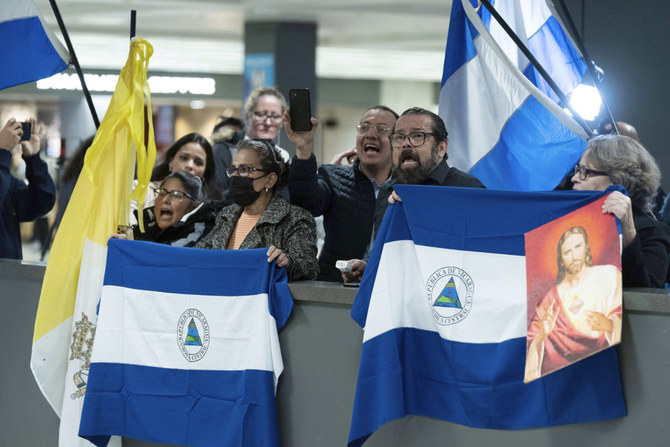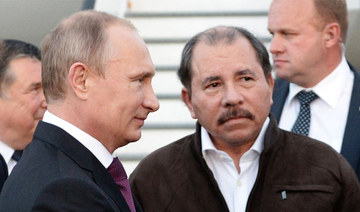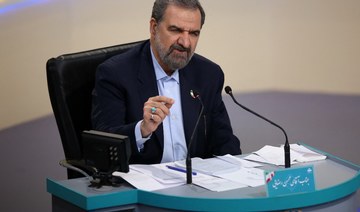MEXICO CITY: Some 222 inmates considered by many to be political prisoners of the government of Nicaraguan President Daniel Ortega flew to Washington on Thursday, US Secretary of State Antony Blinken said.
Blinken said the prisoners had been jailed “for exercising their fundamental freedoms and have endured lengthy unjust detentions.”
“The release of these individuals, one of whom is a US citizen, by the government of Nicaragua marks a constructive step toward addressing human rights abuses in the country and opens the door to further dialogue between the United States and Nicaragua regarding issues of concern,” Blinken said.
He said that among those on the plane were political and business leaders, journalists, civil society representatives and students. Blinken credited “concerted American diplomacy.”
Ortega has maintained that his imprisoned opponents and others were behind 2018 street protests he claims were a plot to overthrow him. Tens of thousands have fled into exile since Nicaraguan security forces violently put down those antigovernment protests in.
The Nicaraguan opposition’s latest count on “political prisoners” held had been 245. It was not immediately clear who was not released.
US State Department spokesman Ned Price said Nicaragua had identified 224 prisoners to be sent on the plane, but two of them declined. They were not identified.
Roman Catholic Bishop Rolando Álvarez was on a list of 39 prisoners who were not on the plane compiled by the nongovernmental group Mechanism for Recognition of Political Prisoners.
Price said those who arrived in Washington came voluntarily and would receive humanitarian parole allowing them to stay in the country for two years. They were staying at hotels under responsibility of US Customs and Border Protection and the Department of Homeland Security and the government would work with nongovernmental organizations to help in their resettlement.
“It was the Nicaraguan government that decided to offer the opportunity to these individuals to travel the United States,” Price said. “When I say this is a product of American engagement, as you know, we have long called for the release of individuals imprisoned in Nicaragua for exercising their fundamental freedoms as a first step toward the restoration of democracy and an improved human rights climate in Nicaragua.”
Back in Nicaragua, a judge read a statement saying the 222 prisoners had been “deported.”
Octavio Rothschuh, a magistrate on the Managua Appeals court, said the deportation was carried out under an order issued Wednesday that declared the prisoners “traitors to the country.” He said they were deported for actions that undermined Nicaragua’s independence and sovereignty.
Later Thursday, Nicaragua’s Congress unanimously approved a constitutional change allowing “traitors” to be stripped of their nationality. It will require a second vote in the next legislative session later this year.
Wilma Nuñez, president of the Nicaragua Center for Human Rights, said in a statement that while the prisoners’ release was welcome, “deportation is a legal term that applies to foreigners who commit crimes in a country. They want to call exile a deportation, which is absolutely arbitrary and prohibited by international human rights norms.”
Arturo McFields, Nicaragua’s former ambassador to the Organization of American States, celebrated the release, which he said the US State Department had confirmed to him.
“It is a massive freeing” of prisoners seldom seen, McFields said. He credited the prisoners’ families for never letting up the pressure.
Berta Valle, the wife of opposition leader Felix Maradiaga, said the State Department told her that her husband was on the plane.
According to US officials, also among those aboard the flight were Cristiana Chamorro, who had been a leading presidential contender before her arrest in 2021. Daughter of former President Violeta Chamorro, she was sentenced last March to eight years in prison. She was convicted of money laundering through her mother’s nongovernmental organization as Ortega pursued NGOs that received foreign funding. She was being held under house arrest.
Other one-time presidential hopefuls Arturo Cruz and Juan Sebastian Chamorro were also on the flight, US officials said.
Ortega upped his pursuit of political opponents in early 2021, looking to clear the field ahead of presidential elections in November of that year. Security forces arrested seven potential presidential contenders and Ortega romped to a fourth consecutive term in elections that the US and other countries termed a farce.
Nicaraguan judges sentenced several opposition leaders, including former high-level officials of the governing Sandinista movement and former presidential contenders, to prison terms for “conspiracy to undermine national integrity.”
Given the notoriously bad conditions at the infamous El Chipote prison and others, as well as the age of some of the opposition leaders, relatives had feared the terms may effectively be death sentences.
Hugo Torres, a former Sandinista guerrilla leader who once led a raid that helped free then rebel Ortega from prison, died while awaiting trial. He was 73.
Nicaraguan judges also sentenced five Catholic priests to prison this week for conspiracy and spreading false information. It was not immediately clear if any of them were on the flight.
Nicaragua frees 222 opponents of Ortega, sends them to US
https://arab.news/9a54f
Nicaragua frees 222 opponents of Ortega, sends them to US

- Nicaraguan President Ortega claimed that the prisoners were behind 2018 street protests he claims were a plot to overthrow him
- Tens of thousands have fled into exile since Nicaraguan security forces violently put down those antigovernment protests in
8 EU members say conditions in Syria should be reassessed to allow voluntary refugee returns

In a joint declaration, officials from Austria, the Czech Republic, Cyprus, Denmark, Greece, Italy, Malta and Poland said they agree on a re-assessment that would lead to “more effective ways of handling” Syrian refugees trying to reach European Union countries.
The eight countries, which held talks during a summit meeting in the Cypriot capital, said the situation in Syria has “considerably evolved,” even though complete political stability hasn’t been achieved.
Cyprus has in recent months seen an upsurge of Syrian refugees reaching the island nation primarily from Lebanon aboard rickety boats.
Earlier this month, the EU announced a 1 billion euro ($1.06 billion) aid package for Lebanon aimed at boosting border controls to halt the flow of asylum seekers and migrants to Cyprus and Italy.
The eight countries said the EU should further boost support for Lebanon to “mitigate the risk of even greater flows from Lebanon to the EU.”
“Decisions as to who has the right to cross a member state’s borders, should be taken by the government of the relevant member state and not by criminal networks engaged in migrant smuggling and trafficking in human beings,” the joint declaration said.
A Cypriot official said that any re-evaluation of conditions within Syria would not necessarily mean that Syrian refugees would be deported back to their country. Instead, Syrian refugees hailing from areas re-designated as safe would lose any allowances, benefits and the right to work, creating a disincentive to others to come to Cyprus.
The official was speaking on condition of anonymity because he wasn’t allowed to speak publicly about details of the proposal.
The countries said that while they “fully embrace” the need to support Syrian refugees in line with international law, they hoped their talks could open a wider debate within the 27-member bloc on the process of granting the migrants international protection.
In Lebanon, where anti-refugee sentiment has been surging recently, more than 300 Syrian refugees returned to Syria in a convoy earlier this week.
Lebanese officials have long urged the international community to either resettle the refugees in other countries or help them return to Syria.
Belgium’s Ghent university severs ties with three Israeli institutions

- Ties being cut with Holon Institute of Technology, MIGAL Galilee Research Institute, and the Volcani Center, which carries out agricultural research
- The three Israeli institutions did not immediately comment
BRUSSELS: Belgium’s University of Ghent (UGent) is severing ties with three Israeli educational or research institutions which it says no longer align with UGent’s human rights policy, its rector said.
Pro-Palestinian protesters in Ghent have been protesting against Israel’s military offensive in Gaza and have been occupying parts of the university since early this month.
The university’s rector, Rik Van de Walle, said in a statement that ties were being cut with Holon Institute of Technology, MIGAL Galilee Research Institute, and the Volcani Center, which carries out agricultural research.
“We currently assess these three partners as (very) problematic according to the Ghent University human rights test, in contrast to the positive evaluation we gave these partners at the start of our collaboration,” Van de Walle said.
Partnerships with MIGAL Galilee Research Institute and the Volcani Center “were no longer desirable” due to their affiliation with Israeli ministries, an investigation by the University of Ghent found, and collaboration with the Holon Institute “was problematic” because it provided material support to the army for actions in Gaza.
A spokesperson for the university said the move would affect four projects.
The three Israeli institutions did not immediately comment.
The protesters told Belgian broadcaster VRT they welcomed the decision but regarded it as only a first step. They said they would continue their occupation of parts of the university “until UGent breaks its ties with all Israeli institutions.”
The actions mirror those of students in the United States and elsewhere in Europe, calling for an immediate permanent ceasefire and for schools to cut financial ties with companies they say are profiting from what they regard as the oppression of Palestinians.
Muslim professionals quit ‘hostile’ France in silent brain drain

PARIS: After being knocked back at some 50 interviews for consulting jobs in France despite his ample qualifications, Muslim business school graduate Adam packed his bags and moved to a new life in Dubai.
“I feel much better here than in France,” the 32-year-old of North African descent told AFP.
“We’re all equal. You can have a boss who’s Indian, Arab or a French person,” he said.
“My religion is more accepted.”
Highly-qualified French citizens from Muslim backgrounds, often the children of immigrants, are leaving France in a quiet brain drain, seeking a new start abroad in cities like London, New York, Montreal or Dubai, according to a new study.
The authors of “France, you love it but you leave it”, published last month, said it was difficult to estimate exactly how many.
But they found that 71 percent of more than 1,000 people who responded to their survey circulated online had left in part because of racism and discrimination.
Adam, who asked that his surname not be used, told AFP his new job in the United Arab Emirates has given him fresh perspective.
In France “you need to work twice as hard when you come from certain minorities”, he said.
He said he was “extremely grateful” for his French education and missed his friends, family and the rich cultural life of the country where he grew up.
But he said he was glad to have quit its “Islamophobia” and “systemic racism” that meant he was stopped by police for no reason.
France has long been a country of immigration, including from its former colonies in North and West Africa.
But today the descendants of Muslim immigrants who came to France seeking a better future say they have been living in an increasingly hostile environment, especially after the attacks in Paris in 2015 that killed 130 people.
They say France’s particular form of secularism, which bans all religious symbols in public schools including headscarves and long robes, seems to disproportionately focus on the attire of Muslim women.
Another French Muslim, a 33-year-old tech employee of Moroccan descent, told AFP he and his pregnant wife were planning to emigrate to “a more peaceful society” in southeast Asia.
He said he would miss France’s “sublime” cuisine and the queues outside the bakeries.
But “we’re suffocating in France”, said the business school graduate with a five-figure monthly salary.
He described wanting to leave “this ambient gloom”, in which television news channels seem to target all Muslims as scapegoats.
The tech employee, who moved to Paris after growing up in its lower-income suburbs, said he has been living in the same block of flats for two years.
“But still they ask me what I’m doing inside my building,” he said.
“It’s so humiliating.”
“This constant humiliation is even more frustrating as I contribute very honestly to this society as someone with a high income who pays a lot of taxes,” he added.
A 1978 French law bans collecting data on a person’s race, ethnicity or religion, which makes it difficult to have broad statistics on discrimination.
But a young person “perceived as black or Arab” is 20 times more likely to face an identity check than the rest of the population, France’s rights ombudsman found in 2017.
The Observatory for Inequalities says that racism is on the decline in France, with 60 percent of French people declaring they are “not at all racist”.
But still, it adds, a job candidate with a French name has a 50 percent better chance of being called by an employer than one with a North African one.
A third professional, a 30-year-old Franco-Algerian with two masters degrees from top schools, told AFP he was leaving in June for a job in Dubai because France had become “complicated”.
The investment banker, the son of an Algerian cleaner who grew up within Paris, said he enjoyed his job, but he was starting to feel he had hit a “glass ceiling”
He also said he had felt French politics shift to the right in recent years.
“The atmosphere in France has really deteriorated,” he said, alluding to some pundits equating all people of his background to extremists or troublemakers from housing estates.
“Muslims are clearly second-class citizens,” he said.
Adam, the consultant, said more privileged French Muslims emigrating was just the “tiny visible part of the iceberg”.
“When we see France today, we’re broken,” he said.
North Korea fires multiple short-range ballistic missiles, Seoul says

- South Korea’s Joint Chiefs of Staff did not immediately provide details of the projectile or its trajectory
- North Korea has launched a range of ballistic and cruise missiles as well as tactical rockets in recent months
SEOUL: North Korea fired a number of short-range ballistic missiles toward the sea off its east coast on Friday, South Korea’s military said, a day after the US and South Korea conducted joint drills with stealth fighter jets simulating air combat.
South Korea’s Joint Chiefs of Staff condemned the launch as a provocation. It said the projectiles were fired from the east coast town of Wonsan and flew about 300 km (186 miles) before landing in the sea.
Citing a government official, Japan’s public broadcaster NHK also reported that a short-range missile appeared to have been launched and had already fallen.
North Korea has launched ballistic and cruise missiles as well as tactical rockets in recent months, describing them as part of a program to upgrade its defensive capabilities.
South Korea’s military did not specify the latest type of weapon, but the North’s state media has reported that its military has been testing multiple launch rocket systems that are being upgraded.
North Korean leader Kim Jong Un viewed the testing of 600 mm “super-large” multiple rocket launchers and 240 mm multiple launch rockets in recent weeks and also visited production facilities, state media reported.
Tensions on the Korean peninsula have increased since the North last year scrapped a 2018 pact aimed at de-escalating tensions near the military border drawn up under a truce ending the 1950-53 Korean War and then labelled the South “enemy No. 1.”
Earlier on Friday, the powerful sister of North Korea’s leader, Kim Yo Jong, said its tactical weapons were intended solely as a deterrent against South Korean military aggression, while again denying that Pyongyang was exporting the weapons.
US and South Korean officials have accused the North of shipping weapons to Russia to help Moscow replenish stocks for use in its war against Ukraine. Moscow and Pyongyang have denied the accusation.
Friday’s missile launches come at the same time as a visit by Russian President Vladimir Putin to the Chinese northeastern city of Harbin.
Putin and Chinese President Xi Jinping criticized Washington and its allies on Thursday for what the leaders called “intimidation in the military sphere” against North Korea at a meeting in Beijing.
South Korea’s air force has said US and South Korean stealth fighters conducted “intense” joint exercises on Thursday in the central region to test and enhance offensive and defensive maneuverability.
French police ‘neutralized’ armed person who tried to set fire to synagogue in Rouen — Darmanin

- The incident occurred early on Friday morning
PARIS: French police in Rouen shot dead an armed man who set fire to the city’s synagogue, Interior Minister Gerald Darmanin and local officials said on Friday.
The incident occurred in central Rouen, 130 kilometers northwest of Paris, early on Friday morning, Darmanin said in a post on social network X.
The attacker’s identity and motive were still unclear. He was carrying a knife and iron bar, according to local authorities.
France hosts the Olympic Summer Games in two months and recently raised its alert status to the highest level against a complex geopolitical backdrop in the Middle East and Europe’s eastern flank.
Elie Korchia, the president of France’s Consistoire Central Jewish worshippers body, said police had “avoided another anti-Semitic tragedy.”
Regional broadcaster France 3 said fire fighters were on the site. The fire had been brought under control, a Rouen city hall official said.
Rouen’s mayor said the Normandy town was ‘battered and shocked’.
The city in 2016 was rocked by an attack later claimed by the Islamic State, when a priest was killed with a knife during service in town of Saint-Étienne-du-Rouvray, in the southern part of Rouen’s urban agglomeration.





















